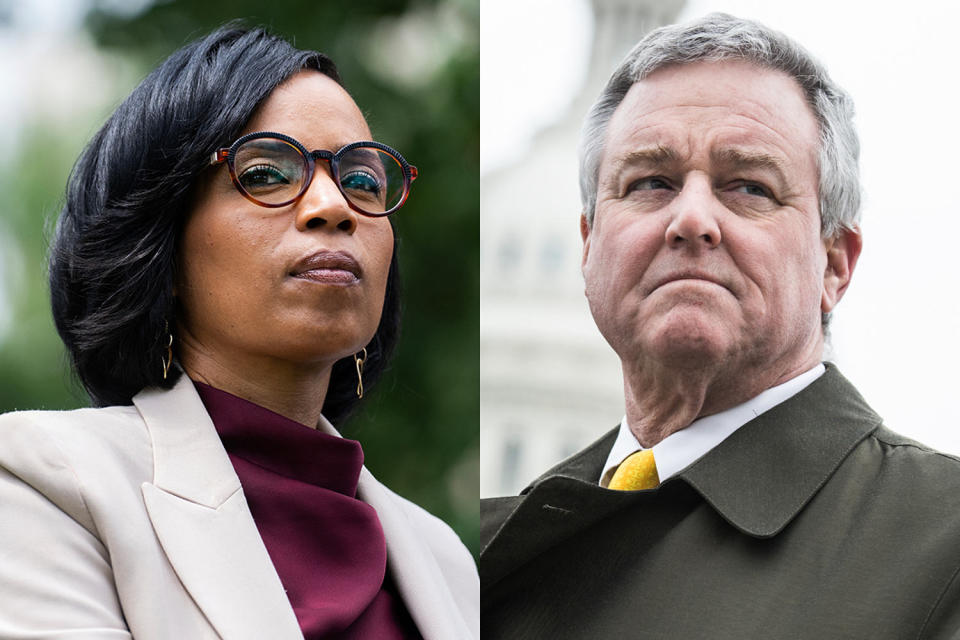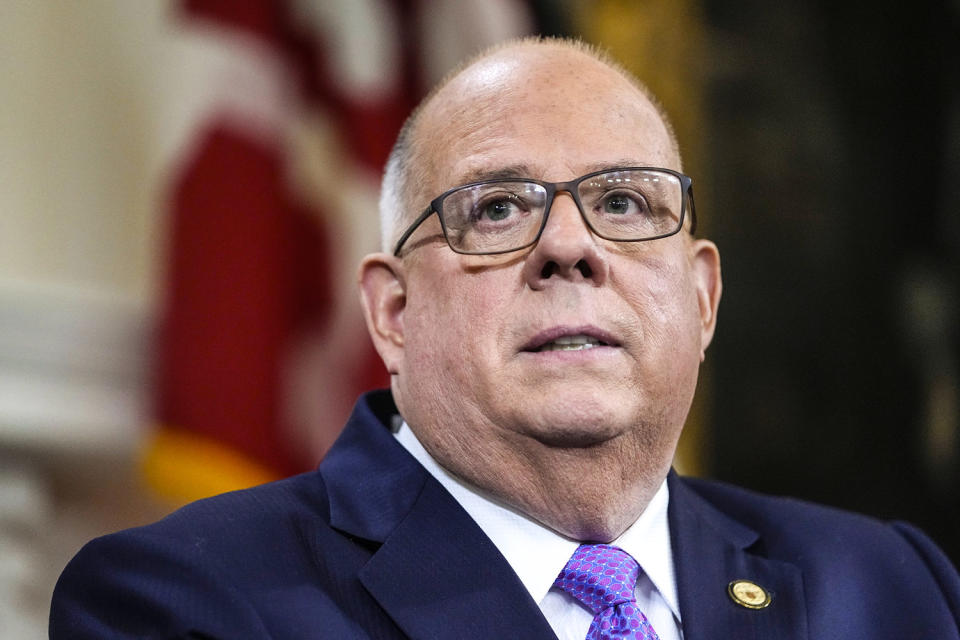Maryland Democrats battle for party's future — and control of the Senate
- Oops!Something went wrong.Please try again later.
- Oops!Something went wrong.Please try again later.
- Oops!Something went wrong.Please try again later.
SILVER SPRING, Md. — Maryland’s Senate race was supposed to be a battle for the soul of the Democratic Party. Instead, it’s turned into something else: a key race in the battle for the Senate majority.
Former GOP Gov. Larry Hogan’s decision to run for the state’s open Senate seat scrambled the stakes, and now Democrats competing in Tuesday’s primary aren’t just making the case about what type of Democrat should be in the Senate. They’re each arguing that they’re the better candidate to take on Hogan in November — if Hogan wins his own primary on Tuesday.

Democratic Rep. David Trone has spent more than $60 million of his own personal fortune on the primary as he takes on Prince George’s County Executive Angela Alsobrooks, who is vying to become the state’s first Black senator and one of the few Black women to ever serve in the upper chamber.
“The big argument you hear for Trone being better positioned is his resources,” said Rep. Jamie Raskin, D-Md., who has endorsed Alsobrooks. “And the big argument you hear for Alsobrooks being better positioned is that she’s building a coalition of people across the state who could conceivably beat that kind of money.”
“So in some sense, the primary is a good testing ground for both of those theories,” Raskin added.
Millions hit the Maryland airwaves
Trone, the co-founder of the alcohol retailer Total Wine & More, has built out a sprawling campaign using his wealth.
It’s not just the more than $47 million he’s spent on campaign ads compared to Alsobrooks’ $4 million, according to the ad-tracking firm AdImpact. Campaign finance records show Trone’s campaign payroll included three times more staffers than Alsobrooks’.
Some Trone campaign workers outside early voting locations told NBC News they were paid as much as $350 a day, though others said they were not. (Alsobrooks’ campaign says she doesn’t pay volunteers.)
Battling a massive spending disparity, Alsobrooks has accused Trone of trying to “buy” the Senate seat.
“This is not what democracy looks like in this country,” she said in an interview during a campaign stop in Silver Spring.
Trone argues that his wealth means special interests have no sway over him.
“It’s the No. 1 thing voters really like and appreciate, the fact that you came from nothing, and started with zero, became successful. Everyone likes success. That’s the American dream,” he said in an interview last week, adding: “We can be truly independent.”
Voters gave mixed reviews to Trone’s cash blast.
“I don’t think he’s really given us a reason to vote for him other than that he’s rich and has the money,” said Julia House, a 60 year-old retiree from Mitchellville, as she went to cast her ballot for Alsobrooks at an early voting site in Landover last week.
Brett Zurer, a Silver Spring resident who voted for Trone, said he was focused on which candidate could beat Hogan in November. Asked whether he was concerned about Trone’s self-funding, Zurer replied: “Not at all.”

“His positions are the positions that I agree with,” he added.
While Trone has been dominating the spending, thanks to his self-funding, Alsobrooks got some last minute help from EMILY’s List, an organization which supports female Democrats who back abortion rights, which has spent $2.2 million on ads in the race so far.
The money helped to close the massive ad-spending gap in Trone’s favor — from 14-to-1 before EMILY’s List started spending to 2-to-1 in Trone’s favor in the final days of the campaign. But some Alsobrooks supporters wondered if the spending came too late.
Targeting Black voters
Some Democratic voters said they are voting for Alsobrooks, in part, because they hope to elect another Black woman to the Senate in November, where only three have ever served.
Alsobrooks, a Prince George’s County native, leads Maryland’s second-largest county, previously having served as its domestic violence prosecutor and later its first Black woman state’s attorney.
“I feel every person should be able to look in the Senate and see themselves,” Alsobrooks told NBC News. “I’m not in this race because I’m Black and a woman, but I am proud to be a Black woman. But I am also proud that I have the kind of experience that will help bring home the results for Maryland.”
Trone has attempted to appeal to the state’s Black voters, who are an important voting bloc in the Democratic primary.
But Trone has also stumbled on the subject of race, grabbing headlines earlier this year for using a racial slur during a congressional hearing, which he said was an inadvertent slip when addressing Office of Management and Budget Director Shalanda Young, who is Black.
“While attempting to use the word ‘bugaboo’ in a hearing, I used a phrase that is offensive,” he said at the time. “That word has a long, dark, terrible history. It should never be used any time, anywhere, in any conversation. I recognize that as a white man, I have privilege.”
Asked about his campaign’s outreach to Black voters, Trone told NBC News that he supports diversity and has financially supported “diverse candidates,” and he referenced his childhood on a 200-acre chicken and hog farm in Pennsylvania along the Maryland border, which his family lost to bankruptcy after his parents divorced, noting that he didn’t come from wealth and saying he could relate to voters.
“But at the end of the day, what we hear from so many diverse voters is we need someone who actually speaks for us, somebody who has our values,” Trone said. “I went to public school, [Alsobrooks] went to private school.”
“Someone who lived the life they did,” Trone continued. “I didn’t even have indoor plumbing. We had an outhouse. And I grew up in a family that was destroyed by alcoholism, destroyed. So we grew up in a tough circumstance, and things weren’t easy. But at the end of the day, we became successful and said, OK now I got to give back.”
Trone is touting support from politicians including state Attorney General Anthony Brown, Rep. Dutch Ruppersberger and Prince George’s County State’s Attorney Aisha Braveboy (from Alsobrooks’ home county), as well as dozens of his Democratic peers in Congress.
Alsobrooks’ backers include Gov. Wes Moore and Lt. Gov. Aruna Miller, as well as Baltimore Mayor Brandon Scott, key state legislative leaders and six members of the Maryland congressional delegation.
A looming fight in November
The prospect of running against Hogan has loomed large in the Democratic primary, with Trone’s closing ads stressing that he’ll use “every resource” to defeat the Republican.
It’s a point Trone’s allies, and even his opponents, admit could help him — Trone’s massive wallet could allow Democrats to spend money defending their slim Senate majority in other states.
Alsobrooks’ allies, though, believe she can rally the coalition necessary to beat Hogan and provide a sharper contrast as a female candidate in a year in which abortion is expected to be a top issue.
Of course, Hogan still has to win the GOP primary on Tuesday. A vocal Trump critic, Hogan is facing Robin Ficker, a perennial candidate who is self-funding his campaign and has outspent Hogan on the airwaves, launching ads saying Ficker will “stand with President Trump.”
The National Republican Senatorial Committee has teamed up with Hogan for ads ahead of the primary, launching spots focused on immigration, a top issue to GOP primary voters.
Hogan acknowledges he faces a tough path to victory in the fall, assuming he wins his primary. President Joe Biden won Maryland by 33 points in 2020, and the state hasn’t sent a Republican to the Senate since 1987.
“It’s really, really difficult,” Hogan told NBC News in an interview at a campaign fundraiser in Davidsonville last week. “The top of the ticket is probably not going to do that well.”
If Hogan wins his primary, Democrats plan to tie him to the broader Republican Party, especially on the issue of abortion. Hogan vowed to leave abortion rights up to the states.
“When I announced this race, I was attacked by both of the other challengers saying I’m going to be the deciding vote on the national abortion ban. I said, ‘No, I would never vote for the national abortion ban.’” Hogan said.
But the abortion issue could turn off some of his former supporters, like Laurie Whiting, a Davidsonville resident who twice voted for Hogan for governor. She said she doesn’t trust Hogan to represent her on the federal level and is supporting Trone in the Democratic primary.
“I know that [Hogan]’s telling us he would stay the way he was before, he supported Maryland, but I’m a little concerned about the Republican ticket,” Whiting said.
The threat of Hogan’s candidacy has some Democrats nervous about November.
“I wish he wasn’t [running],” said House, the Alsobrooks supporter from Mitchellville. “People love him. So it’s going to be hard.”
That tough fight against Hogan weighed heavily on Coleen, a 68 year-old retiree from Bowie who declined to give her last name and cast her ballot for Trone at the same polling place in Landover.
“I don’t think Alsobrooks can beat Hogan in a statewide race,” said Coleen, a Black woman, explaining that she believes a white candidate can have more appeal in rural counties.
“I want the Democrat to win,” she said. “So it’s all strategic on my part.”
This article was originally published on NBCNews.com

